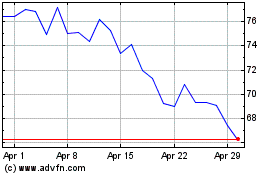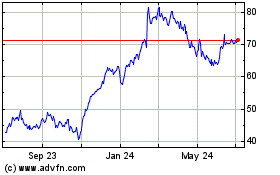Uber's First Quarter Shows Food Delivery's Continuing Strength
May 05 2021 - 4:44PM
Dow Jones News
By Preetika Rana
Uber Technologies Inc.'s first-quarter bookings rose despite
weak demand for its ride-sharing service, as sustained growth in
its food-delivery business offset the slump in its core
operations.
Uber's gross bookings grew 24% year-over-year to $19.5 billion
in the three months ended March, of which $12.5 billion came from
its food-delivery arm. Uber Eats' bookings more than doubled from a
year earlier, while Uber's ride business declined 38% over the same
period.
Even though Uber's total bookings grew and beat analyst
forecasts, its overall revenue declined because of an adjustment
tied to a driver reclassification dispute in the U.K. The company
reported revenue of $2.9 billion after setting aside $600 million
tied to the reclassification. That compares with revenue of $3.2
billion in the same period last year.
In March -- after losing a monthslong legal battle -- Uber
granted its U.K. drivers an employment status entitling them to
vacation pay and pension contributions. While Uber won a major
reclassification dispute in its home state of California late last
year, regulatory challenges are far from over.
The Biden administration said earlier Wednesday it would block a
Trump-era proposal that sought to make it easier for Uber and
others to continue classifying gig workers as independent
contractors. The move maintains the status quo, meaning Uber
doesn't need to change its labor model. But the current
administration's stance may add to regulatory snares down the
road.
Despite the U.K. changes, the company reported a narrower net
loss as it benefited from the recent sale of its self-driving unit.
Uber reported a net loss of $108 million, compared with a loss of
$2.9 billion in the year-earlier period.
The San Francisco-based ride-hailing company also narrowed its
adjusted loss before interest, taxes, depreciation and
amortization, beating Wall Street's projections. Uber reported an
adjusted Ebitda loss of $359 million, compared with a loss by that
measure of $612 million in the same year-ago period. Analysts
surveyed by FactSet had expected an adjusted Ebitda loss of $452
million.
Investors are closely watching this number because Uber has said
it expects to be profitable by this measure before the year ends.
Silicon Valley startups often point to an adjusted metric that
strips the business of certain costs so they can show investors a
path to profitable growth.
Write to Preetika Rana at preetika.rana@wsj.com
(END) Dow Jones Newswires
May 05, 2021 16:29 ET (20:29 GMT)
Copyright (c) 2021 Dow Jones & Company, Inc.
Uber Technologies (NYSE:UBER)
Historical Stock Chart
From Aug 2024 to Sep 2024

Uber Technologies (NYSE:UBER)
Historical Stock Chart
From Sep 2023 to Sep 2024
